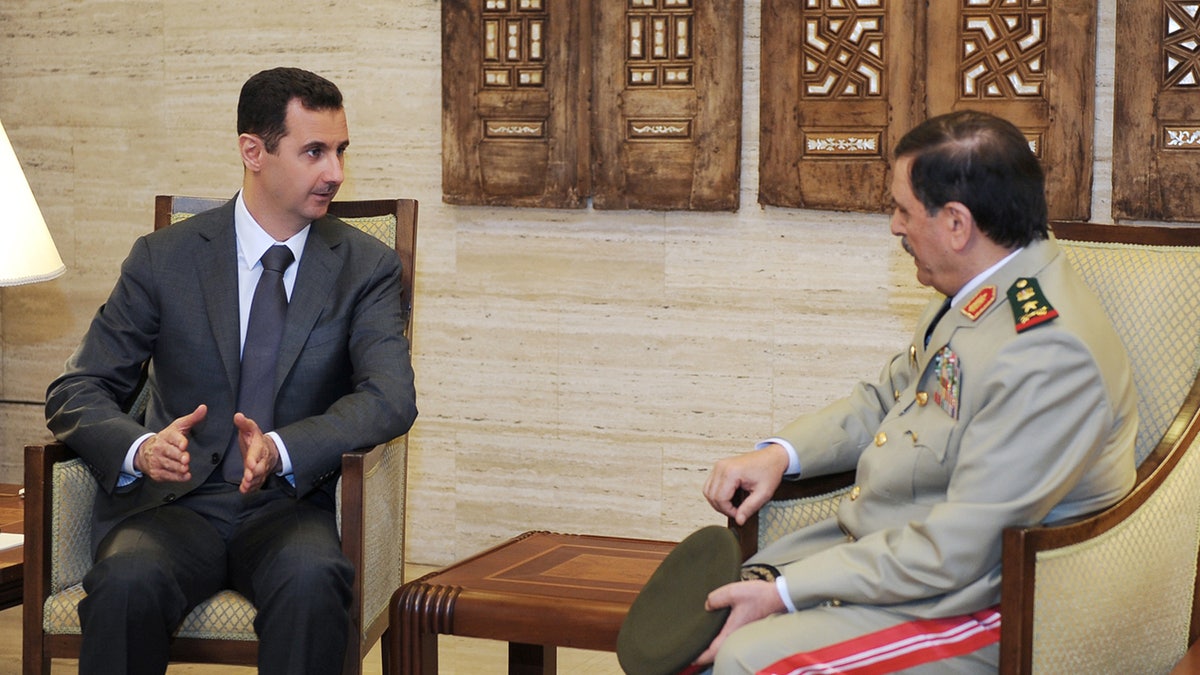
July 19, 2012: In this photo released by the Syrian official news agency SANA, Syrian President Bashar Assad, left, meets with Fahd Jassem al-Freij, Syria's new Defense Minister, in Damascus, Syria. (AP2012)
PARIS – Russia's ambassador to France said Friday that he believes Syria's president is ready to step down "in a civilized way." But the Syrian government immediately denied it.
Alexander Orlov said that Bashar Assad's acceptance of an international agreement in June for a transition toward a more democratic regime, and his subsequent step of naming a representative to negotiate the transition, meant that he was prepared to give up leadership.
The country is sliding into even further chaos, with fighting around the capital Damascus intensifying two days after the inner circle of Assad's regime was hit by an attack that killed three top Syrian defense officials.
"Personally ... I think it will be difficult for him to stay in office given everything that's happened," Orlov said in an interview with Radio France Internationale.
Orlov spoke a day after Moscow vetoed a Western-backed U.N. resolution aimed at pressuring President Bashar Assad's government to end the war. Friday was the deadline for the U.N. to renew its 300-member observer mission in Syria, or let the mandate expire.
Orlov noted in the interview that Assad accepted the final statement of the June 30 Geneva agreement for a transition "toward a more democratic regime" then went the next step, naming a representative to negotiate the transition with the opposition. In essence, that meant that "he accepted to leave, but leave in a civilized way," the ambassador said.
Syrian TV quickly said that the interview had been taken out of context. Russian Embassy spokesman Sergei Parinov also said the ambassador's statement was "incorrectly interpreted" by international media. Parinov told The Associated Press that the ambassador just "restated" Russia's interpretation of Assad's response to the Geneva agreement. Parinov said the ambassador's statement was not referring to any new information coming from the Assad regime on Friday.
The remarks by the ambassador appeared to be adding a new layer of interpretation to the Geneva agreement, which was based on a U.N.-brokered peace plan that Syria's president was party to. In fact, Russian Foreign Minister Sergey Lavrov underlined at the time that the plan does not require Assad's ouster, saying there is "no attempt in the document to impose on the Syrian people any type of transitional process."
Russia, which along with China has blocked U.N. action on the Security Council, has long-standing close ties with Damascus that, through a Syrian port, offers Moscow its only window on the Mediterranean Sea.
It was not immediately clear whether the ambassador's talk about Assad's future was meant to send a signal to Damascus.
A Russian political analyst thinks that Assad "naturally" chose a Russian diplomat to float the idea of his resignation -- openly sought by Western nations.
"If it's true that now Assad is ready to consider the matter of his resignation, it is natural to translate the idea through Russia that has all this time been (Syria's) main political partner," Fyodor Lukyanov, the Moscow-based editor of Russia in Global Affairs magazine, said in an interview with AP.
Moscow bristled at Western attempts to "put the blame" on Russia for escalating the Syrian civil war, hours after Moscow vetoed the U.N. resolution meant to pressure Assad's government to end the conflict.
Russia was adamantly opposed to any mention of Chapter 7 of the United Nations Charter, which could eventually allow the use of force to end hostilities in Syria.
Russian Foreign Ministry spokesman Alexander Lukashevich said in televised remarks that the attempts of "certain Western countries" to blame Russia for the escalation of the Syrian war are "absolutely unacceptable."
The West has been intensifying its pressure on Assad, with the latest move coming from the EU.
European Union nations will enforce an arms embargo against Syria by boarding ships and aircraft carrying suspicious cargo to the war-torn nation, an official said Friday.
The senior EU official said obligatory inspections will start after being adopted by foreign ministers Monday. The official spoke on condition of anonymity because he is not authorized to speak to the media on the record.
The 28-nation bloc banned arms exports to Syria in May 2011. But until now, governments couldn't decide whether or not to check suspicious cargo.
The inspections will take place only on EU territory or in its waters, the official said.
The EU has frozen the assets of 43 companies and 128 people believed to be associated with Syrian repression, or benefiting from the regime. About two dozen new names will likely be added next week, said an EU diplomat who could not be named for the same reason.
